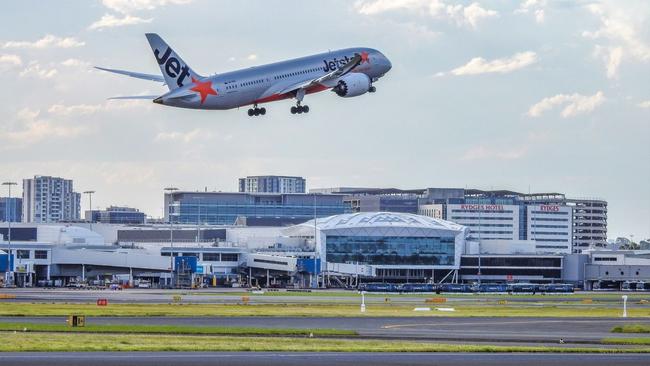Knowing what these travel code words mean can save you thousands
Dreaming about money for nothing and your drinks for free? These are the terms you need to know to make sure you get the best value for your holiday cash.

Lifestyle
Don't miss out on the headlines from Lifestyle. Followed categories will be added to My News.
When it comes to getting more bang for your holiday bucks, it helps to understand what is being offered in the first place. Easier said than done, you might think, when the terms and conditions the travel industry relies on appear to be written in Aramaic.
Fear not, we’re here to decipher the key terms, recurring phrases and strange abbreviations a traveller might encounter. The upshot: knowledge is power. Correctly informed, you can extract the most from your next trip – and avoid any pitfalls.
BLACKOUT DATES
A term that strikes fear in the hearts of parents of school-age children everywhere, blackout dates are specific and predetermined periods when discounts, promotions or reservations offered by hotels, airlines or cruises are either restricted or unavailable.The restricted days help tourism businesses maximise revenue and manage demand during busy times, and essentially mean you can forget nabbing that advertised deal over Christmas, Easter or throughout any week which falls within the school holidays. The ability to use frequent flyer rewards can also be affected.

FLEXIBLE TICKET
It’s a tale as old as time: the minute you hit the “Pay now” button on your airfare, that long-awaited surgery slot/job offer/holiday deal becomes available. Changes and cancellations to a standard ticket attract a swath of charges, but a flexible ticket allows you to make penalty-free modifications to your flight, whether it be the date, time or even your destination, right up to the last minute. True, flexible tickets cost more than a standard fare, but they’re worth it for the peace of mind.Just be sure to check the fine print on the flexible ticket you have your eye on as some airlines may have restrictions on the types of changes they allow.
ON-BOARD CREDIT
On-board credit (commonly referred to as plain old “OBC” in cruising circles) is essentially financial credit – or free money – applied to your shipboard account to spend during your voyage. Often advertised as a booking bonus, such as for when you book early or book future cruises with the same line, you may also be offered on-board credit in cases where a cruise line has cancelled or modified an itinerary, or where there’s been a significant price drop since you bought your fare and you’ve alerted the cruise line that you know about it.
Make it your mission to spend it all: your on-board credit balance can’t be carried over to your next cruise.

SINGLE SUPPLEMENT
The travel industry equivalent of jury duty, there isn’t a solo traveller alive who hasn’t tried to get out of paying the dreaded single (or solo) supplement – a fee charged by travel providers to offset the financial loss of having a single person occupying a room or cabin designed for double occupancy.
The supplement can be anywhere between a reasonable 10 per cent to a whopping 200 per cent of the standard rate, but you can avoid the fee by keeping your eyes peeled for certain itineraries where the supplement is waived, a solo cabin is offered, or by opting to share a room with someone of the same gender when you book a group tour.
HOLIDAY NOW, PAY LATER
This does exactly what it says on the tin, allowing cash-strapped travellers to book and enjoy a holiday now, while worrying about the associated inconveniences – such as how you’re going to pay for it – later.
Details vary between providers but this approach often means paying the balance over weekly, fortnightly or monthly instalments, with no credit checks undertaken or – provided you make your payments on time – interest charged. Convenient? Sure, but the potential downsides (debt accumulation through fees and charges, plus limited consumer protections) aren’t insignificant.

FULL BOARD
One step below an all-inclusive holiday, finding the words “Full board” attached to a property on your itinerary means three square meals are included with your stay.While it could be the perfect choice for those who don’t drink alcohol (drinks and snacks are rarely included), there is also the risk you’ll end up paying for a service you won’t use if you want to try dining at local restaurants.
Only got half board? You can count on breakfast and either lunch or dinner at the property, leaving flexibility to indulge in some local flavours outside the resort.
RESORT CREDIT
Not unlike infomercial salesmen throwing in a set of free steak knives to get the purchase of a range of saucepans over the line, properties (resorts in particular) will often add a range of additional perks to convey the sense that the guest is getting value beyond a standard accommodation package.
At hotels, these credits can be used for dining, activities or spa treatments at the property, daily breakfast, transfers and/or flights – all the things not already included in an all-inclusive rate.

OPEN-JAW FLIGHT
Sadly, this isn’t in reference to the jaw-dropping fares we’re all awaiting, but a ticket where you fly into one city such as Athens and return home from another (say Istanbul), having made your way between those two destinations via a separate airline ticket, or by car, rail, cruise or tour.
While open-jaw bookings can sometimes work out to be a cheaper proposition than reserving multiple one-way flights, be aware that cancellations or making changes to your flights can be complicated and expensive.
OPTIONAL
Spot the word “optional” on an itinerary or tour program and the likelihood of the activity being offered free of charge is the stuff of unicorns and fairy dust. It basically means that instead of enjoying free time by the pool, you may have the option of signing up for an activity, but to do so will be at an additional cost. Sometimes these optional activities can be decided and paid for during the booking process, but they can also be paid for during the tour itself if you suddenly decide you want in on the action.
Is it cheaper to book optional activities upfront? While package deals tend to be cheaper, the advertised price ultimately depends on the provider. It’s always worth doing your own independent research, first establishing the price of the activity – say, a Turkish bath experience – offered by the tour operator, and then checking with the hamam (Turkish bath) itself to see what the true cost of admission would be. Making a few phone calls, or at the very least, checking their websites for real-time pricing information, could save you hundreds of dollars.

5 TRAVEL TERMS TO BEWARE OF
1. Partially obstructed view
On a ship, the obstruction can mean a pole, but it could also mean your water views are eclipsed by a lifeboat. Tread carefully and make sure to do your research by checking cruise deck plans.
2. LCC
A low-cost carrier that can offer a cheap fare by getting you from point A to point B without any of the bells and whistles (meals, entertainment, baggage) full-service airlines provide.
3. Dynamic pricing
A strategy where travel operators modify their prices based on demand, availability or time of booking, so that a seemingly great fare can be drastically inflated the next time you look.
4. MCT
“Minimum connect time” is the shortest allowable time required to transfer from one flight to a connecting flight. MCTs vary between destinations and airlines, but three hours is ideal for international, while 90 minutes is generally safe for domestic.
5. Bumping
It sounds like a trending dance on TikTok, but bumping refers to that awkward episode when an airline has oversold a flight leading to the removal of passengers. You might score an airline credit for volunteering.
Originally published as Knowing what these travel code words mean can save you thousands





